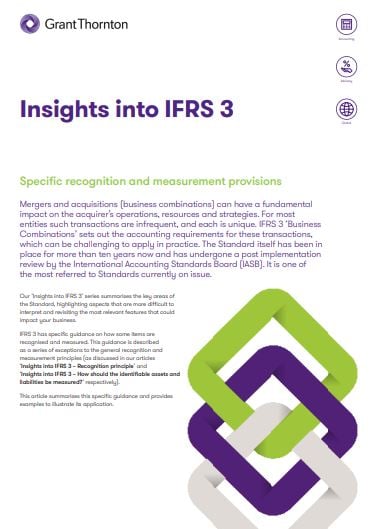-
Aviation Advisory
Our dedicated Aviation Advisory team bring best-in-class expertise across modelling, lease management, financial accounting and transaction execution as well as technical services completed by certified engineers.
-
Business Risk Services
Our Business Risk Services team leverage our risk, internal audit and technology subject matter expertise to critically assess your governance, risk and internal control mechanisms, thus helping you to better manage risk and enable more informed decision making.
-
Consulting
Whatever your business needs, our Consulting team can help you to move forward and identify and implement major transformations efficiently and effortlessly.
-
Financial Accounting and Advisory Services (FAAS)
As organisations expand into new markets or undertake functional financial transformations, the challenges faced by their accounting and finance teams become more complex. The Financial Accounting and Advisory Services (FAAS) team at Grant Thornton is a multi-disciplinary team that designs and implements creative solutions to address these complexities.
-
Fintech
Our Fintech team will be offering you an opportunity to sit with our experienced consultants to discuss your challenges.
-
Forensic Accounting
Organisations may undergo some type of dispute or internal investigation during their lifetime. Our Forensic Accounting team can seek evidence that can make the difference between finding the truth or being left in the dark.
-
Risk Advisory
Our Risk Advisory team delivers innovative solutions and strategic insights for the Financial Services sector, addressing disruptive forces, regulatory changes, and emerging trends to enhance risk management and foster competitive advantage.
-
Sustainability Desk
We recognise that businesses are operating at different levels of maturity when it comes to sustainability, and pride ourselves on working with our clients to develop bespoke solutions to their exact needs.
-
Company Tax
Our tax team is made up of highly experienced professionals who work with our clients to ensure they are compliant with all aspects of their corporation tax obligations by gaining a deep understanding of the businesses.
-
Global Mobility
Grant Thornton offer a different approach to managing global mobility. We have brought together specialists from our tax, global payroll, people and change and financial accounting teams
-
Indirect Tax Advisory & Compliance
Our Indirect Tax team helps businesses manage their IOM, UK and global indirect tax risks which, as transactional taxes, can quickly become large liabilities.
-
International Tax
We work closely with our colleagues globally to provide a seamless multi-jurisdiction service offering which ensures clients have an appropriate tax structure that mirrors what they are doing operationally – a key consideration in a world where it is no longer possible to separate a company’s tax and operational presences.
-
Private Client
Our team of experienced advisors can assist and navigate you through the tax issues arising when establishing a business, moving to the Island, leaving the island, passing on wealth alongside residence and domicile issues. We can help minimise the impact that taxes, such as income tax, capital gains tax and inheritance tax, may have upon your personal wealth.

IFRS 3 ‘Business Combinations’ sets out the accounting requirements for these transactions, which can be challenging to apply in practice. The Standard itself has been in place for more than ten years now and has undergone a post implementation review by the International Accounting Standards Board (IASB). It is one of the most referred to Standards currently on issue.
Our ‘Insights into IFRS 3’ series summarises the key areas of the Standard, highlighting aspects that are more difficult to interpret and revisiting the most relevant features that could impact your business.
IFRS 3 has specific guidance on how some items are recognised and measured. This guidance is described as a series of exceptions to the general recognition and measurement principles (as discussed in our articles ‘Insights into IFRS 3 – Recognition principle’ and ‘Insights into IFRS 3 – How should the identifiable assets and liabilities be measured?’ respectively).
This article summarises this specific guidance and provides examples to illustrate its application.









